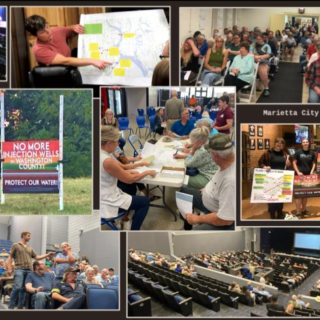Despite the chilly wet weather, over 70 fracking opponents held a spirited rally for the "Don't Waste Ohio" Legislator Accountability Day at the Ohio Statehouse in Columbus, Ohio on April 2, 2014. Fracking, or hydraulic fracturing, is the process of injecting mass amounts of water into rock formations in order to shatter the ground and release oil and natural gas.
The citizen groups were attempting to gain sponsorship for grassroots led legislation introduced in 2012 to ban Class II injection wells (HB 148, SB 178). This legislation would ban liquid fracking waste in Ohio including: Class II injection wells, enhanced recovery wells, road brine application and treated fracking flowback from being re-introduced into public water supplies. There are currently 234 injection wells in Ohio and 202 of those are active.
The water for injection wells is waste water from other wells and industrial processes. It is often toxic and sometimes radioactive. More than half of the water used to frack in Ohio comes from outside of the state. Not of all of the water injected into the ground is recovered. Some of this radioactive water, or water from other fracking wells remains in the ground.
The chemicals used are unregulated and untested. The process of fracking has been linked to poisoned wells, gas explosions in the kitchens and bathrooms of nearby homes, and serious earthquakes including a magnitude 6 earthquake with an epicenter near Youngstown.
Chemicals found in fracking waste water in Pennsylvania and West Virginia include such deadly toxins and radioactive chemicals as cyanide, mercury, strontium, radium, lead and arsenic. Radioactivity found in some fracking waste water exceeds discharge limits placed on the Nuclear Regulatory Agency on nuclear power plants and other facilities by more than 300 times.
Fracking opponents who spoke against the practice today spoke of retaliation against citizens opposed to the practice by both government and industry. The Free Press previously reported on fracking opponents being targeted for counter-terrorism surveillance for attending movies. One man at the rally described losing his job because of an editorial he wrote in a local newspaper after pressure from industry representatives.
A representative from the Ohio Sierra Club spoke of a plan by Governor Kasich and the Ohio Department of Natural Resources to better represent fracking to the public while vilifying fracking opponents in order to open state parks and forests to the practice.
The Free Press has previously reported on the large campaign cash handouts to the Ohio legislature by the fracking industry. While fracking opponents rallied on the Statehouse steps, fracking industry spokespeople kept a close watch from a distance while actively engaging the mainstream press with their talking points.
The rally wrapped up with a march away from the statehouse with fracking opponents vowing to continue the fight and stop both new wells and ban the importation of radioactive fracking waste into Ohio in what Free Press Editor Bob Fitrakis called “mobile Chernobyls.”



